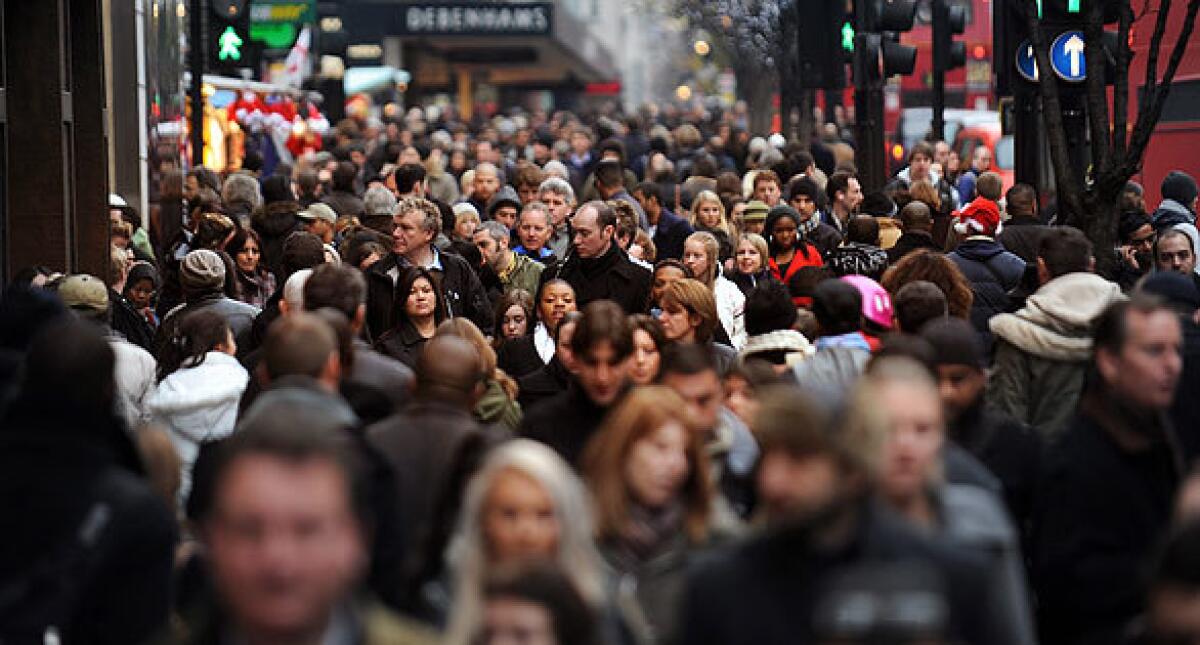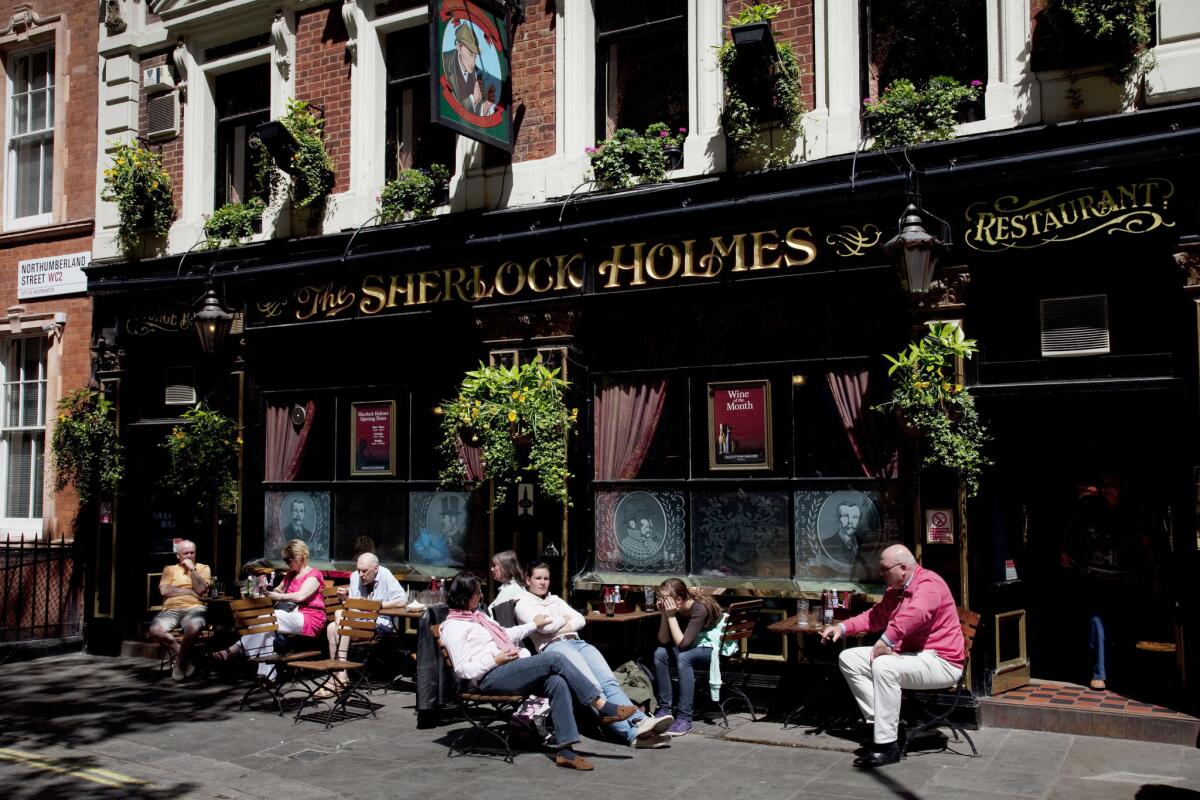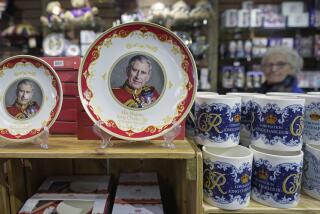As Britain staggers toward Brexit, the pound’s wild ride creates winners and losers

- Share via
LONDON — When Brexit first drove up the cost of importing ingredients like jasmine rice, curry paste and coconut milk from Thailand, London restaurant owner Saiphin Moore traveled to her native country to cut out the middlemen. By finding farmers and manufacturers to supply her directly, she cut costs by 15%, helping her 17-chain Rosa’s Thai Cafe weather the pound’s decline.
Until now, that is.
As the risk that Britain will tumble out of the European Union without a deal leads more traders to bet sterling is headed for 34-year lows, Moore is concerned another big depreciation will be too much to bear for her business. She imports nearly 70% of ingredients and employs many Thai nationals.
“I’ve never been this worried,” said Moore, 51, who opened the first Rosa’s Thai Cafe with her husband Alex near Spitalfields Market in the midst of a recession 10 years ago, when the pound was 40% stronger against the Thai baht. “I’m worried about my staff. Most of our non-local staff have obligations back home, and slowly and painfully the costs of looking after their loved ones, of servicing their debt, have gone up.”
Britain’s messy divorce with Europe is hitting entrepreneurs like Moore hard because the currency fluctuations make it virtually impossible for them to manage inventory. Yet a stroll down British high streets — the English version of America’s bustling Main Street — reveals that for all the business owners dreading the drama that will unfold as the Oct. 31 deadline nears, there are some quietly celebrating the weaker pound.
Managers like Sukhinder Singh, who owns a specialty whiskey retailer, The Whisky Exchange. The more the pound tumbles — it fell as much as 5% to $1.2033 per pound this quarter alone — the cheaper it gets for foreigners to buy expensive British-made liquor.
According to Singh, more tourists stopping by The Whisky Exchange’s Covent Garden and Fitzrovia shops these days are willing to splurge. The retail price of a the most premium bottle of Scottish Dalmore whiskey, for instance, has fallen $9,400 since Brexit, to $108,500. The retailer sells liquor online and the U.S. is the largest overseas market.
“It’s saved us,” Singh said of the pound’s retreat. “Because Brexit was looming a lot of people in the U.K. were very nervous and really stopped buying. The weak pound has helped us because it has brought more international customers.”
Regardless of which side of the Brexit currency divide a business owner happens to fall, what’s certain is small and medium-sized companies are in for a rocky ride as Prime Minister Boris Johnson pledges to exit the bloc “do or die” by the end of October. Some analysts even warn the pound could fall to parity with the dollar, if a hard Brexit unfolds. Betting odds assign an almost 50% chance of that happening.
“I don’t think the risk of no-deal Brexit is fully factored in,” said Philippos Kassimatis, a co-founder at hedging advisory firm Maven Global. If there’s no deal, “it could go to $1.10, and the risk is that it overshoots.“
Sterling fell again Wednesday, dipping 0.7% to $1.2201, after Johnson said he will ask Queen Elizabeth II to suspend the U.K. Parliament from mid-September to mid-October — a move that could hamper lawmakers’ efforts to block a no-deal Brexit.
While large companies have the cash to pay millions of pounds to protect themselves against currency swings with insurance, smaller ones can’t afford this luxury. Instead, managers like Moore at Rosa’s Thai are looking for other ways to cope amid market bets that the pound will be the most volatile in the Group of 10 industrialized countries in the next six months. She’s swapping Asian string beans used in som tam or papaya salad with locally grown French beans and replacing Chinese broccoli, or gai lan, with local spring greens.
Here’s a glimpse at some of the other losers and winners from the pound’s relentless drop:
Winners: foreign students
Britain was already the most popular academic destination after the U.S. and the weaker sterling is only driving the appeal. International student enrollments at U.K. universities rose to 458,520 in the 2017-2018 academic year from the average of 432,546 in the three years prior to the Brexit referendum, according Studying-in-UK.org.
One of those students is Mia Chen, a Taiwanese graduate student of marketing strategy at University of Warwick. She’s been using the money she saves on tuition and accommodation to do more sightseeing and invest in a small collection of luxury handbags from designers like Chloe and Bottega Veneta. With the pound down 3% against the Taiwanese dollar in the past 12 months, she says more students are strongly considering studying in the U.K.
“I heard of cases back home where some students are choosing U.K. instead of the U.S. for postgraduate programs because of sterling,” said Chen. “It definitely matters.”
Chinese nationals are the biggest group of foreign students in the U.K. and applications for undergraduate programs in Britain have surged 30% from last year, Universities and Colleges Admissions Service data show. The jump may also reflect U.S. restrictions on academic visas.
Losers: retail shop owners
People like Chen may help to soften the blow Brexit is having on struggling high-street mainstays like Debenhams Plc, Topshop and Marks & Spencer Plc, but that won’t be enough to pull the retail industry out of the doldrums. Conditions are already the toughest in a decade, according to the British Retail Consortium.
U.K. retailers often get their stock from the Middle East and pay for it in dollars, anytime from seven to 120 days after delivery, according to Richard Hyman, an independent retail analyst. This means many companies haven’t yet felt the pain of the latest bout of pound weakness this summer. Retailers also hedge their currency exposure, but “you can only hedge so far,” said Hyman.
“Clearly, the pound going down means we will be importing price inflation,” he said. “The second reason it’s so difficult is it comes at a time when U.K. retail is already on its knees.”

Winners: tour operators
The weaker pound has contributed to boosting tourist arrivals to the U.K., which are likely to reach 38.9 million arrivals this year, nearing a record set in 2017, according to VisitBritain, the national tourism agency. They will probably spend about 24.5 billion pounds ($30 billion), matching the all-time high in 2017.
Deloitte estimates that the tourism gross-value-added multiplier in the U.K. is 2.8, meaning that for every 1,000 pounds spent directly on tourism, there is another 1,800 pounds that support the economy through various channels, such as consumer spending.
Losers: pensioners abroad
For retirees living abroad like Roger Boaden, the falling sterling is hurting their wallets. Boaden, 79, and his wife moved to France in 2002 in search of a standard of living they could no longer afford in the U.K. But since November 2015, the value of his British pension has dropped by more than 500 euros ($556) a month.
He now monitors the exchange rate every day to transfer pounds “just to get a few extra euros” each time it temporarily recovers. Sterling has been one of the most volatile major currencies in the past year, trading as strong as $1.3381 per pound and as weak as almost $1.20.
“You’ve just got to live with it because there’s nothing you can do about it,” said Boaden. “When it’s high we know we’ve got a bit of spare cash and you can go on outings and what have you. When it’s low you just say we won’t go out this month.”
More to Read
Inside the business of entertainment
The Wide Shot brings you news, analysis and insights on everything from streaming wars to production — and what it all means for the future.
You may occasionally receive promotional content from the Los Angeles Times.










